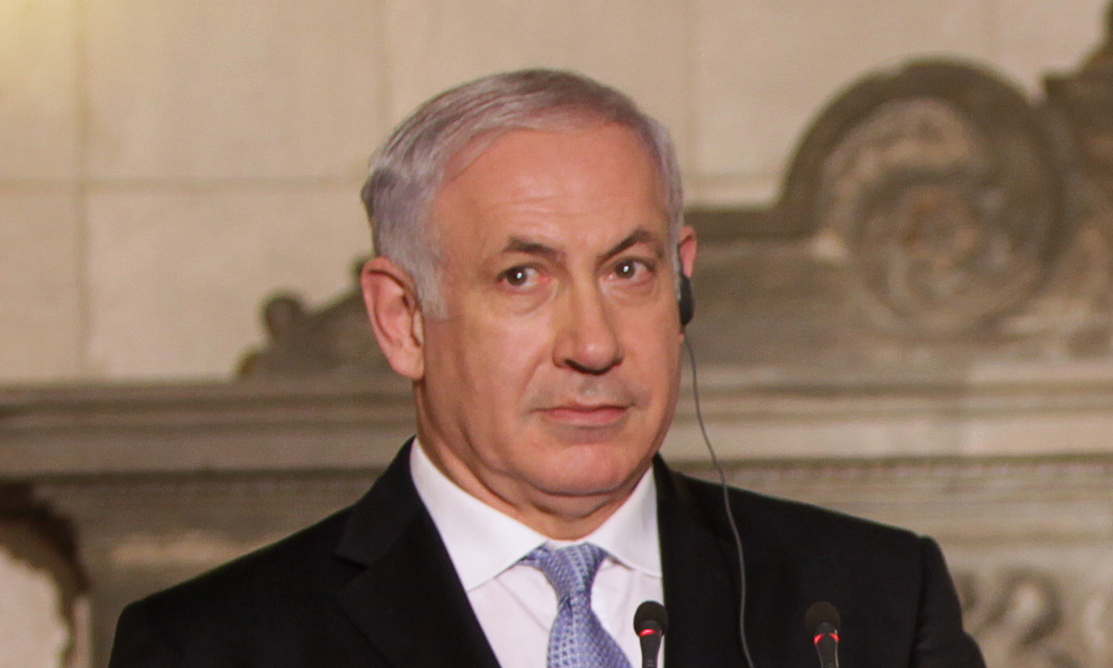Although the Netanyahu administration has been roundly criticized for its brutal treatment of Palestinians, lack of commitment to the peace process, and flouting of international law, it might ironically be the more mundane charges of common graft that ultimately bring about the prime minister’s downfall. As Israeli police announce they have recommended charges of bribery, fraud, and breach of trust be brought against Prime Minister Benjamin Netanyahu, the reign of Israel’s second-longest-serving head of government looks increasingly precarious.
Corruption is not an unfamiliar word to Netanyahu. As he himself admitted in his televised response on Tuesday evening to the most recent charges brought against him, “Over the years I have been the subject of at least 15 enquiries and investigations.” These include two previous occasions when charges were brought against the PM—but later dropped—accusing him of misusing public funds and retaining official gifts that should have been handed over to the state.
But this time the charges are significantly more serious, and appear amid a flurry of recent reports alleging malfeasance by the prime minister: recordings of Mr. Netanyahu’s wife and eldest son leaked to the press, and they were as farcical as they were unsettling. And now, ironically, it looks like the self-styled Israeli hard-man, who has built a reputation of imperviousness to the vicissitudes of life in Israeli politics, may have manufactured his own downfall.
But how did Netanyahu, who campaigned on the slogan of being ‘good for the Jews’, wind up being the target of corruption charges that now pose a meaningful existential threat to the political dynasty he has built?
In 2009, it is alleged that the then recently-elected Israeli prime minister accepted gifts of a combined value of approximately one million shekels (nearly $300,000), including expensive cigars, jewelery and champagne, from Israeli Hollywood mogul Arnon Milchan, and his business partner and Australian billionaire James Packer, in exchange for political favors. These favors are said to have included Netanyahu’s pushing for the so-called Milchan Law, an amendment to legislation which exempts Israelis returning to live in Israel from abroad from paying taxes for ten years. This amendment could have saved Milchan over a million shekels. Netanyahu’s intervention to save Israeli Channel 10 (in which Milchan holds a minority stake) from collapse only intensified suspicion surrounding the nature of their relationship.
The second set of charges brought by police against the prime minister concern his dealings with Arnon Mozes, publisher of Israel’s second most widely circulated newspaper, Yedioth Ahronoth. Netanyahu is accused of promising Mozes that he would take steps to limit the circulation of a rival newspaper, Yisrael Hayom, on the condition that Mozes would provide favorable press for the prime minister. Netanyahu’s defense: this was a personal friendship which would never have been based on a tit-for-tat exchange of professional favors. Now Netanyahu has launched a fully-fledged counter-offensive à la Trump on the ‘fake news’ of the left-wing media, which, he claims, is waging a shameful witch-hunt against his family and him.
The Likud leader is simultaneously implicated in an investigation over Israel’s $2 billion deal for the purchase of three submarines and four patrol boats from the German shipbuilding company Thyssen Krupp. At present, investigators are looking into a possible conflict of interest between Netanyahu’s personal lawyer and the local representative of Thyssen Krupp in Israel.
Netanyahu’s wife, Sara, has also come under investigation for misuse of public funds at the couple’s official residences, including the use of government money to pay for private chefs at family events, for a caregiver for her father, and for electrical work at the couple’s residence in Caesarea. These allegations were compounded by the embarrassment when a recording from 2009 was leaked to the press of Mrs. Netanyahu ranting at a member of her staff, who had politely reminded her of her commitment to attend an event in support of refugees from Darfur.
Last but by no means least in contributing to the scandals hanging over Netanyahu is his own eldest son, Yair. Previously sued for libel by Israeli think tank Molad (after having referred to the organization as “radical, anti-Zionist … funded by the fund for Israel’s destruction”, a reference to the left-wing NGO, New Israel Fund), a recording of the prime minister’s son was leaked to the press less than a month ago which embarrassed the entire Netanyahu family. In the tape, the intoxicated Yair complained to the son of Israeli tycoon Kobi Maimon that the latter would not offer Netanyahu the meagre sum of 400 shekels to use at a Tel Aviv strip club despite the fact that his father had arranged a $20 billion deal on natural gas drilling for the senior Maimon. And how had Yair arrived at the strip club that Friday night? By state-funded transportation for the prime minister’s family.
The numerous scandals surrounding the Netanyahu family, as well as pending criminal investigations, led many in Israel to question whether Netanyahu can feasibly focus on the vital job of running the country. Weekly anti-corruption protests of tens of thousands of Israelis in Tel Aviv calling for Netanyahu’s ousting have also become a regular fixture in Israeli life recently. It is in this environment that the Israeli police’s recommendation of charges against Netanyahu will be seen as but a further intensification of pressure on the embattled leader. Whether he will weather this storm remains to be seen.
